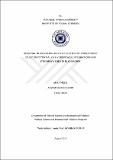DSpace Repository
REGIONAL INTEGRATION AND THE POLITICS OF HYDROPOWER: STUDY ON POTENTIAL OF HYDROPOWER INTEGRATIONS AND ETHIOPIA’S ROLE IN IGAD REGION
JavaScript is disabled for your browser. Some features of this site may not work without it.
| dc.contributor.author | Seman Kedir, Anwar
|
|
| dc.date.accessioned | 2019-05-26T05:59:33Z | |
| dc.date.available | 2019-05-26T05:59:33Z | |
| dc.date.issued | 2016 | |
| dc.identifier.uri | http://hdl.handle.net/11547/2164 | |
| dc.description.abstract | IGAD üyesi ülkeler aşırı yoksulluk, kuraklık, hızlı nüfus artışı ve gıda güvencesizliği gibi benzer problemlerle karşı karşıya kalmaktadır. Bu gibi problemlerle mücadele etmede; güç ara bağlantısı, yol ve demiryolu inşaatı gibi altyapı yatırımlarını yaparak karşılıklı bağımlılığı geliştirmek, bu problemlerin hafifletilmesine ve çevre ülkelerle yakın ekonomik ilişkiler geliştirilmesine zemin hazırlamaktadır. Enerji toplam altyapının ciddi bir kısmını oluşturduğundan enerji entegrasyonu, karşılıklı bağımlılığın önemli bir parçasıdır. Beraberinde, bölgesel bazda enerji piyasalarının gelişimi ciddi kazanımlara işaret etmektedir. Afrika'nın su kuleleri arasında Etiyopya, temiz enerji üretimi bakımından pek çok fırsat sunmakta ve 45,000 MW'den fazla elektrik üretebilme potansiyeli ile Sahra Altı Afrika'nın büyük bölümünün cari elektrik talebini karşılayacak yeterliliktedir. Daha da önemlisi, Etiyopya'nın nüfus büyüklüğü, görece iç istikrarı, askeri ve diplomatik gücü bölgesel güç olmasına, bölgesel barışı ve güvenlik yatırımlarını yönlendirecek bir pozisyon almasına olanaksağlamaktadır. Bu tezin amacı, IGAD bölgesinde entegre bir birlik oluşturmada Etiyopya'nın ana rolünü keşfetmektir. Hükümetlerarası ve Yeni İşlevselcilik teorileri entegrasyonun temel ilkelerini anlamada çalışmaya fayda sağlamıştır. Her iki teori de bölgesel entegrasyonu hidro-güç gibi kamusal mallar aracılığıyla ele almakta ve onun zincirleme etkisiyle çevre ülkelerine daha ileri düzeyde entegrasyonunu açıklamaktadır. Bu tezin sorunsalına daha çok nitel analiz araştırma teknikleriyle yaklaşılmıştır. Bu çalışmanın ek bir avantajı içeriğinin niceliksel olarak desteklenmesidir çünkü entegre ve potansiyel entegre projelerde ampirik veriler kullanılmıştır. Ayrıca, ampirik veriler kamusal mallar aracılığıyla enerji merkezi ve bölgesel entegrasyonu teorik kavramlarla vurgulamaktadır. | tr_TR |
| dc.language.iso | tr | tr_TR |
| dc.publisher | ISTANBUL AYDIN UNIVERSITY INSTITUTE OF SOCIAL SCIENCES | tr_TR |
| dc.subject | Bölgesel entegrasyon | tr_TR |
| dc.subject | Enerji entegrasyonu | tr_TR |
| dc.subject | Hidroelektrik | tr_TR |
| dc.subject | Enerji merkezi | tr_TR |
| dc.subject | IGAD bölge | tr_TR |
| dc.subject | Regional integration | tr_TR |
| dc.subject | Energy integration | tr_TR |
| dc.subject | Hydropower | tr_TR |
| dc.subject | Energy hub | tr_TR |
| dc.subject | IGAD region | tr_TR |
| dc.title | REGIONAL INTEGRATION AND THE POLITICS OF HYDROPOWER: STUDY ON POTENTIAL OF HYDROPOWER INTEGRATIONS AND ETHIOPIA’S ROLE IN IGAD REGION | tr_TR |
| dc.type | Thesis | tr_TR |
| dc.description.abstractol | It is evident that efficient and clean energy supplies are needed to fuel IGAD member countries’ development and fight against poverty as energy underpins the provision of clean water, health services, education and communication. Energy is a significant part of the total infrastructure that allows rural and urban poor to grow beyond subsistence activity. However, most proportion of IGAD region societies still dependent on traditional and energy sources and, IGAD region faces challenges of low level of infrastructural development. Fostering interdependence among countries of the region through infrastructure development such as power interconnection, road and railway constructions provide a base for alleviating common challenges and creating closer economic community. Regional integration through energy development is an important aspect of such interdependence. On this regard, as one of water towers of Africa, Ethiopia offers a great deal of opportunity for clean energy production, Ethiopia’s potential to generate more than 45,000MW power is enough to meet most of sub-Saharan Africa’s current electricity demand. More importantly, Ethiopia’s population size, relative internal stability, military power and diplomatic strength have enabled it to position itself as a regional power and to drive regional peace and security initiatives. This thesis aims to explore the major roles that Ethiopia is playing for the formation of integrated community in IGAD region. Theories of intergovermentalism and neo- functionalism supported the study to understand the main principles of integration. Both theories explain regional integration through public goods such as hydropower and its knock on effect for further integration among neighbouring countries. The research questions of this thesis are well approached by qualitative analysis research methodology. The thesis also has the additional merit of being quantitatively backed, as there are empirical data on the integrated projects and potential integrated projects that underscores the theoretical concept of energy hub, and regional integration through public goods. | tr_TR |
| dc.publisher.firstpagenumber | 1 | tr_TR |
| dc.publisher.lastpagenumber | 81 | tr_TR |
Files in this item
This item appears in the following Collection(s)
-
Tezler -- Thesis [3470]
